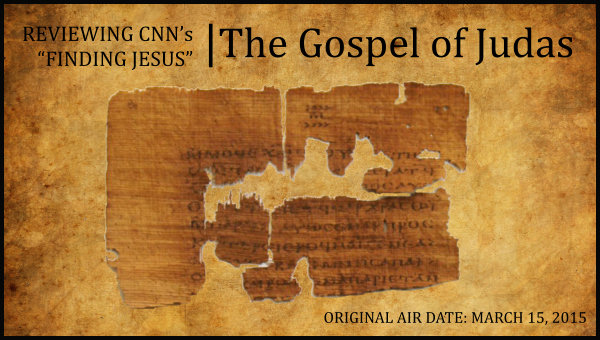By Tyson Thorne

Once again I have nothing but praise for the work of the CNN crew on their series “Finding Jesus”. In the third episode they discuss the person of Judas and 20th century find of the Gospel of Judas. They begin according to their pattern of dramatically telling the story from the Biblical accounts starting with his call to follow Jesus and ending with his suicide before plunging into the origins and story of the ancient text bearing his name. Amazingly, they do justice to both in just 42 minutes.
Any careful reader of the Bible knows that Judas didn’t write a gospel account of his own, as he simply didn’t have time – after all, he killed himself shortly after the crucifixion of Jesus. And the CNN report is careful to point out that this isn’t the gospel “according to” Judas, as the other gospels are titled, and that Judas is clearly not the author of the work which was penned likely around 170 to 180 AD. They continue on to reveal the likely purpose of the book and the title.
In Bible college we were informed about this unique text and told it was the work of Gnostics, a popular “mystery religion” of the time that promised adherents would receive secret knowledge as they worked through the ranks of the order. And from early evidence this seemed to be likely. However, once the manuscript was seen in its entirety (which didn’t happen until nearly 20 years after its first discovery) we learn that this simply isn’t the case.
Instead, the story was written as a condemnation of the organization of Christianity into a formal religion. Instead of Judas being a hero who alone understood the true message of the Christ, we learn that the text criticizes not only Judas - who is called a demon - and the other disciples as clueless betrayers of the true gospel. In fact, the book isn’t a religious treatise at all but rather a polemic (that is, a political argument) against the early church fathers for institutionalizing the Jesus movement. It is no wonder, then, that the text was declared a heresy in 180 AD.
If you are at all interested in the discovery and illicit history of the text I encourage you to watch the episode itself. It’s treatment of Judas as we see him in the Bible and the ancient text bearing his name are both very good, with perhaps the only stone left unturned being the separate accounts of Judas’ death which we have already covered here at Think-Biblically. This controversy would likely have caused the episode to run long, however, and wouldn’t have contributed to the overall point of the episode.
Which brings us to the title of the work itself. Why would someone write against church leadership and attribute the piece to Judas, the most notorious betrayer of history? To put it in modern day parlance, it was click-bait. Besides shielding the identity of the true author it guaranteed that many Christians would want to read it and would be duped into examining something altogether different from their expectation.
CNN’s depiction of both Judas and the ancient text The Gospel of Judas is fair, accurate and truthful and does one more thing that they likely never intended. I don’t know about you but when I talk to unbeliever’s about the Bible they point to other writings, like the Gospel of Judas, and ask how it was decided what would make it in the Bible and what wouldn’t. Without going into the process and tests each document had to endure (authorship had to be genuine and confirmed for example), this so called “gospel” is clearly not reputable enough to make it in. By understanding the story behind the document it confirms the work done long ago by those who compiled the New Testament.
|
|
